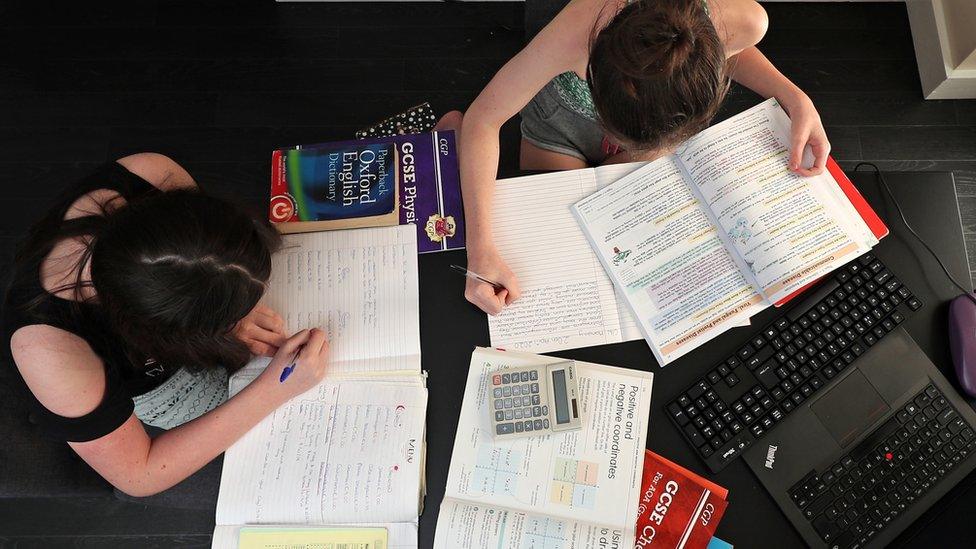A-level and GCSE grades: Call to scrap 'panic-inducing' tests
- Published
"I'm not going to be going into those assessments with the same sort of opportunities as everybody else"
An A-level student has started a campaign to scrap any external exam assessments in Wales this year, calling for grades to be decided by teachers.
Pupils are unlikely to return to any classroom learning in Wales until the end of January at the earliest.
Cai Parry, who is 17 and cares for a family member, said the thought of any external tests was "panic-inducing".
The Welsh Government said its exams advisory group was considering how to adapt plans set out before Christmas.
More than 6,000 people have so far signed a petition calling on the Welsh Government to cancel externally set and marked assessments for A-levels and GCSEs in 2021.
Cai, who lives in Cardiff and hopes to study politics at university next year, said he was concerned the "quality of learning" for pupils had been so varied that it would be unfair to expect students to sit externally set assessments.
"I'm a child carer. And the time I've had to put into that has gone up a lot because of pandemic and it's got to a point where it's really interfering with my ability to study," he said.
"I'm not going to be going into those assessments with the same sort of opportunities as everybody else and it's not going to result in me having a fair grade."
He added that there needed to be a system that considered the "varying circumstances" in which pupils were studying.

AS-level student Manon Clarke thinks the Welsh Government's plans were originally a good idea, but circumstances have changed
Manon Clarke, a 17-year-old AS-level pupil from Cardiff who wants to study medicine at university, is backing the campaign.
She said pupils in "more vulnerable situations" and "who don't have the same facilities to learn online" were disadvantaged.
Although she does not blame her school or teachers, she also does not feel she has "reached far enough" in the courses to sit any assessments.
"I think that whilst they were originally a good idea, now with the circumstances... I don't think that's a good idea at all."

What is happening with GCSE and A-level grades?
In December, Wales' Education Minister Kirsty Williams confirmed the details of a plan under which students would receive grades based on a mix of internal and external assessments, rather than end-of-year exams.
But following the announcement of the move to full-time remote learning earlier this month, exams regulator Qualifications Wales cancelled the spring period of "internal assessments" for GCSE, AS and A-level pupils, which would have been marked by teachers and had been scheduled between 22 February and 23 April.
However, the external assessments, which will be set and marked by the exam board, are still scheduled to take place between 17 May and 29 June.
In England, the government has announced that teachers' estimated grades would be used, although Education Secretary Gavin Williamson has since suggested that some external "mini exams" are being considered.
The Scottish equivalents to GCSE and A levels will be teacher-assessed, while Northern Ireland has also cancelled all GCSE, AS and A-level exams this year.

Plaid Cymru has reiterated its calls for the external tests to be scrapped, and now want an urgent decision to change to teacher-assessed grades, also known as "centre-assessed".
Education spokeswoman Sian Gwenllian said this would be "sensible, practical and fair" and a "a perfectly legitimate alternative system".
"The children have had so much disruption to their education already this year and some children have had more disruption than others," she said.
The chief executive of the WJEC, Wales' exam board, said there were "no easy decisions [or] outcomes".
Ian Morgan said the decision to cancel exams in England "does have a broader impact right across the UK", but that they would push forward with an agenda that suits learners in Wales.
"What we need is to make sure that there's consistency in the process, that everybody is treated fairly and that the level of content and the level of assessment of learners get, is fair and balanced across the board," he added.
A Welsh Government official said following the shift to full-time remote learning its advisory group would now be considering how to "build on and adapt" the proposals to "support learner wellbeing and progression".
"The minister is also discussing with stakeholders including young people and will provide a further update as soon as possible," they said.
- Published16 December 2020

- Published13 January 2021
